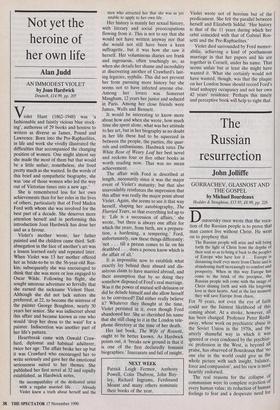Not yet the heroine of her own life
Alan Judd
AN IMMODEST VIOLET by Joan Hardwick
Deutsch, £14.99, pp. 205
Violet Hunt (1862-1948) was 'a fashionable and faintly vicious blue stock- ing', authoress of 29 books and hostess to writers as diverse as James, Pound and Lawrence. Born into the Pre-Raphaelites, in life and work she vividly illustrated the difficulties that accompanied the changing position of women. One might almost say she made the most of them but that would be a little unfair; nonetheless, she lived pretty much as she wanted. In the words of this brief and sympathetic biography, she was 'one of those women who led the way out of Victorian times into a new age.'
She is remembered less for her own achievements than for her roles in the lives of others, particularly that of Ford Madox Ford with whom she was involved for the best part of a decade. She deserves more attention herself and in performing this introduction Joan Hardwick has done her and us a favour.
Violet's mother wrote, her father painted and the children came third. Self- abnegation in the face of another's art was a lesson learned early and repeated later. When Violet was 13 her mother offered her as bride-to-be to the 56-year-old Rus- kin; subsequently she was encouraged to think that she was more or less engaged to Oscar Wilde. Following his flight, she sought amorous adventure so fervidly that she earned the nickname Violent Hunt. Although she did not lack suitors she preferred, at 22, to become the mistress of the painter George Boughton, nearly 30 years her senior. She was indiscreet about this affair and became known as one who would 'drop her dress to the waist' for a painter. Indiscretion was another part of her life's pattern.
Heartbreak came with Oswald Craw- furd, diplomat and habitual adulterer, twice her age. The affair broke her up but it was Crawfurd who encouraged her to write seriously and gave her the emotional seriousness suited to her themes. She published her first novel at 32 and rapidly established, as Hardwick notes,
the incompatibility of the dedicated artist with a regular married life. . Already Violet knew a truth about herself and the men who attracted her that she was as yet unable to apply to her own life.
Her history is mainly her sexual history, with literary and social preoccupations flowing from it. This is not to say that she would not have written anyway nor that she would not still have been a keen suffragette, but it was how she saw it herself. Her voluminous diaries are frank and ingenuous, often touchingly so, as when she details her shame and incredulity at discovering another of Crawfurd's last- ing legacies, syphilis. This did not prevent her from pursuing more history but she seems not to have infected anyone else. Among her lovers was Somerset Maugham, 12 years her junior and seduced in Paris. Among her close friends were James, Wells and Bennett.
It would be interesting to know more about how and when she wrote, how much time she spent alone, what was her attitude to her art, but in her biography as no doubt in her life these had to be squeezed in between the people, the parties, the quar- rels and enthusiasms. Hardwick rates The White Rose of Weary Leaf her best novel and reckons four or five other books as worth reading now. That was no mean achievement.
The affair with Ford is described at length, necessarily since it was the major event of Violet's maturity; but that also unavoidably reinforces the impression that this affair was really the major point about Violet. Again, she seems to see it that way herself, shaping her autobiography, The Flurried Years, so that everything led up to it: 'Life is a succession of affairs,' she wrote, 'but there is always one affair for which the years, from birth, are a prepara- tion, a hardening, a tempering.' Ford, unfortunately, saw these things differently: `not . . . till a person comes to lie on his deathbed . . does a person know which is the affair of all.'
It is impossible now to establish what exactly lay behind their absurd and dis- astrous claim to have married abroad, and their assumption that by so doing they somehow disposed of Ford's real marriage. Was it the power of mutual self-delusion or did he delude himself and she allow herself to be convinced? Did either really believe it? Whatever they thought at the time, Violet persisted in it, even though Ford abandoned her. She so cherished his name that she still clung to it in the London tele- phone directory at the time of her death.
Her last book, The Wife of Rossetti, ought to be better known. As Hardwick points out, it 'breaks new ground in that it is one of the first declaredly feminist biographies.' Inaccurate and full of insight, Violet wrote not of heroism but of the predicament. She felt the parallel between herself and Elizabeth Siddal: 'Her history is that of the 11 years during which her orbit coincided with that of Gabriel Ros- setti and the Pre-Raphaelites.'
Violet died surrounded by Ford memor- abilia, achieving a kind of posthumous marriage in that her papers and his are together in Cornell, under his name. That seems unfair but at least she might have wanted it. What she certainly would not have wanted, though, was that the plaque on her London house should record Ford's brief unhappy occupancy and not her own 42 years' residence. Perhaps this timely and perceptive book will help to right that.























































 Previous page
Previous page